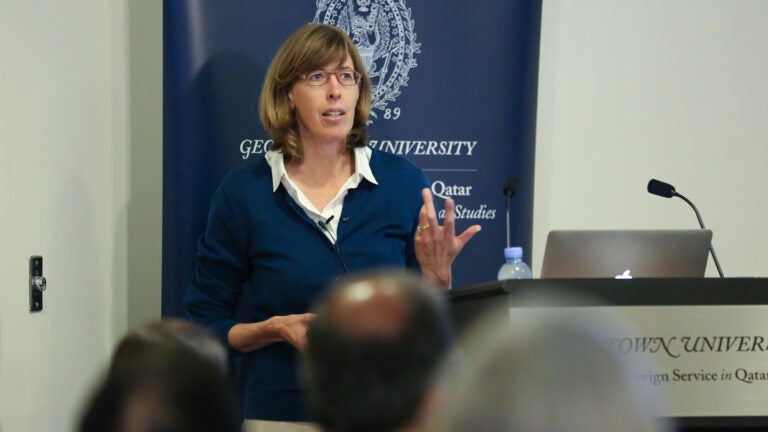Dialogue Series, Environmental Studies, Regional Studies
Environment and Human Insecurity in the Middle East

CIRS invited Jeannie Sowers, Associate Professor of Political Science at the University of New Hampshire, to deliver the inaugural Monthly Dialogue of the 2015-2016 academic year on September 29, 2015. The lecture titled “Environment and Human Insecurity in the Middle East,” highlighted how human well-being and health are directly and indirectly affected by environmental challenges. Important challenges include the provision of urban infrastructures for water and sanitation and the impacts of man-made climate change on the Middle East and North Africa on water resources.
Sowers introduced the notion of an ecological shadow to highlight how environmental challenges often require decision-making and participation across multiple scales. An ecological shadow, she explained, is the “environmental harm from patterns of production, consumption, and disposal that is displaced elsewhere. This displacement can be to other people, it can be to other places, it can be, of course, displaced to other countries,” as well as to future generations. While environmental awareness has been steadily increasing over time, the conceptual distancing of ecological harm remains a serious and widespread problem all over the world, and is, essentially, a prerequisite of economies driven by mass production and consumption. Industrial and industrializing nations often defer negative ecological costs upon those who are most vulnerable to ecological shifts, including those weakest on the political scale, such as poor communities and other species.
Sowers argued that there are a whole host of everyday issues that are often neglected when considering environmental challenges and the causes of human insecurity. One such example is the ubiquitous plastic water bottle that is widely produced, consumed, and discarded in the countries of the Middle East. Despite the seemingly innocuous everyday use of plastic water bottles, Sowers argued that the material is a local as well as a global hazard at the level of its production and disposal. Around 8 percent of the global production of fossil fuels is used to sustain the plastics industry, as a feedstock and as energy used in manufacturing. Even if Middle Eastern countries made serious efforts to encourage or enforce the reuse and recycling of plastics, there still remains a problem with the material’s non-biodegradability. The seemingly small and everyday issue of plastic water bottles, thus becomes a wider issue of environmental politics related to the political economy of plastic, and the ecological shadow it casts.
Inadequate government policies and activities regarding the collection and disposal of solid waste, especially in the poorer countries of the Middle East and North Africa, means that the accumulation of garbage, and especially plastics, have become serious problems for the surrounding environment, including the contamination of air and water, with direct negative consequences for human health. Such solid waste problems also persist in “developed” countries. Despite some success with recycling efforts, to date, “the dominant strategy of waste management in the United States remains simply putting it somewhere else,” Sowers said.
Landfills are something that can perhaps be tolerated by countries with large, empty landmasses, but for a small and overcrowded country like Lebanon, for example, this solution is unsustainable in the long term. With the closure of the main landfill on the outskirts of Beirut, there was a build-up of solid waste on the streets if the city, and an outcry by the affected residents. “For environmental studies, this whole field of inquiry about ecological shadows has been very closely tied to research on environmental justice, which, of course, calls our attention to the unequal distribution of environmental benefits and harm for a given activity, or a given product,” she said.
Sowers offered Beirut’s “You Stink” campaign as a case study example of the convergence of political failure, the environmental effects of mass production and everyday consumption, and the resulting social activism that calls for environmental justice and government accountability. “The campaign itself,” she said “is very interesting in that it mimics many of the strategies, the tactics, and the discourse that we see not only in other environmental campaigns in the Middle East and North Africa, but also, of course, in the Arab uprisings more broadly.”
Ultimately, the ecological shadows associated with the global fossil fuel economy have a long-term effect on climate change and the disruption of weather patterns, which for the Middle East, is a concern considering the already arid nature of many countries. Climate change and increases in weather and water pattern instability has a direct effect on human health and wellbeing, with many communities becoming increasingly displaced, both internally and internationally.
In conclusion, Sowers asked a basic, but fundamental question: “what can we do to reduce the intensity of these shadows?” She gave several suggestions, including technocratic resource management; increasing resource efficiency for any given product; engaging in demand management; increasing mechanisms for environmental accounting by exposing hidden costs to consumers, producers, and governments; and environmental regulation and taxation. Ultimately, however, none of these suggestions will work successfully unless there is a unified, systemic, and inclusive approach to ecological shadows. “In order to have social engagement, you have to start dealing with patterns of economic and political exclusion,” Sowers concluded.
Jeannie Sowers focuses on the intersections between political economy and environmental issues in the Middle East, particularly in Egypt where she has conducted extensive field research. She holds a PhD from Princeton University and a BA from Harvard University. Selected publications include Environmental Politics in Egypt: Experts, Activists, and the State (Routledge, 2013), The Journey to Tahrir: Revolution, Protest, and Social Change in Egypt (co-edited with C. Toensing, Verso, 2012), and articles in Development and Change, Climatic Change, Middle East Report, and International Environmental Agreements. She is on the editorial boards of the journals Global Environmental Politics and Middle East Report.
Article by Suzi Mirgani, Manager and Editor for Publications at CIRS